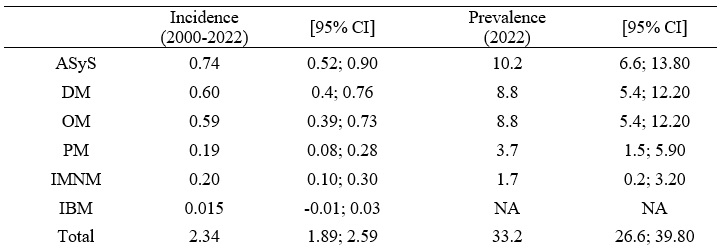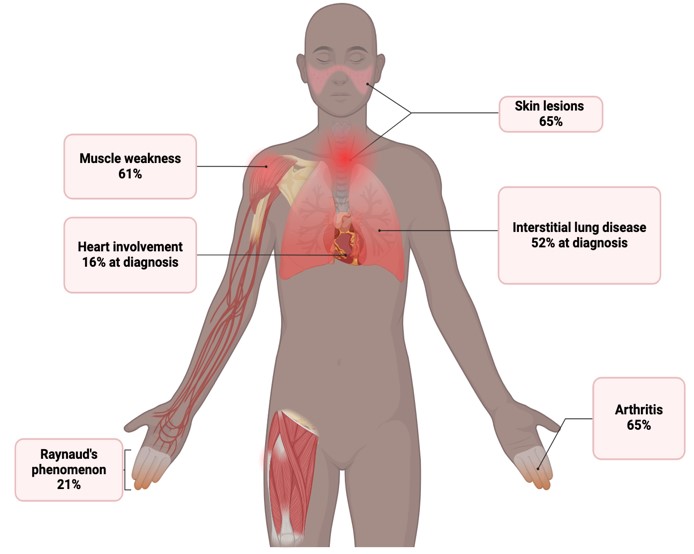Session Information
Date: Sunday, November 17, 2024
Title: Muscle Biology, Myositis & Myopathies – Basic & Clinical Science Poster II
Session Type: Poster Session B
Session Time: 10:30AM-12:30PM
Background/Purpose: Idiopathic inflammatory myopathies (IIM) are heterogeneous systemic autoimmune diseases with a worldwide incidence ranging from 0.116 to 1.9 and a prevalence from 2.4 to 33.8 per 100 000 inhabitants. However, studies in individuals of sub-Saharan ancestry are scarce and more data are needed, from epidemiology to patient characteristics and outcomes.
Objective of the work was therefore to describe the epidemiology, characteristics and evolution of patients with IIM in a population of almost 300,000 adults in the Caribbean Island of Martinique with free access to high-level socialized healthcare.
Methods: We conducted a retrospective longitudinal study from January 1, 2000 to June 2023 at the University Hospital of Martinique, the island’s only tertiary care center, which includes 2 national reference centers.
Patients with an adult-onset IMM, including dermatomyositis (DM), polymyositis (PM), antisynthetase syndrome (ASyS), overlap myositis (OM), immune-mediated necrotizing myopathies (IMNM) and inclusion body myositis (IBM), were included if they met the criteria (Bohan & Peter for probable or definite PM or DM, Connor for ASyS, ENMC International Workshop for IMNM and IBM, and Troyanov’s criteria for OM).
Clinical, biological, and radiological characteristics were collected and compared between subtypes. Number of new diagnosis and living patients per year were used as numerator and total population of Martinique as denominator to calculate incidence and prevalence.
Results: From January 1, 2000 to December 31, 2022, mean incidence of IIM was 2.34 per 100 000 person-year. Global prevalence of IIM reached 33.2/100 000 inhabitants in 2022, with variations between subtypes.
A total of 174 patients (76.4% female) were included, of whom 55 (31.6%) had ASyS, 44 (25.3%) OM, 44 (25.3%) DM, 16 (9.2%) PM, 14 (8.1%) IMNM and 1 (0.6%) IBM.
Patients were diagnosed within a median time of 4.2 months [IQR 2.0; 12.3] from first symptoms, and the median age at diagnosis was 52 [38.9; 61.8].
Initial and cumulative manifestations were inflammatory arthralgia, muscle weakness and skin DM lesions in 110 (65.1%), 95 (61.3%), and 89 patients (53.3%), respectively. Sixteen patients (29.1%) with ASyS had skin dermatomyositis lesions.
At diagnosis, 77 (52%) and 28 patients (16.3%) had interstitial lung disease (ILD) and cardiac involvement, respectively.
ASyS was more frequently clinically amyopathic (p< 0.05) and had more frequently ILD (p< 0.05) than other IIM subtypes. Anti-Jo1 antibody was the most frequent myositis specific autoantibody, followed by anti-PL12, and anti-SRP in 27 (16.0%), 21 (12.4%) and 11 (6.5%) patients, respectively.
Malignancy was diagnosed in 15 patients (8.6%) in a median time of 1.5 months [-24.0; 13.0]. 35 (20.1%) patients died, without statistical differences between groups.
Conclusion: The incidence and prevalence of IMM in the Caribbean island of Martinique appear to be higher than those reported in the literature. ASyS is the most common subtype, and rates of ILD and cardiac involvement at diagnosis also appear to be higher in this population than in other ethnic groups. On the other hand, IBM seems extremely rare.
To cite this abstract in AMA style:
Suzon B, Robert R, Louis-sidney F, Felix A, Coco-Viloin I, Moinet F, Cougnaud R, Bellance R, Amazan E, pierrisnard E, Agossou M, Deligny C, Abel A. Epidemiology and Spectrum of Idiopathic Inflammatory Myopathies in Individuals of Sub-Saharan Ancestry: Data from the Tertiary Care Center of the Caribbean Island of Martinique [abstract]. Arthritis Rheumatol. 2024; 76 (suppl 9). https://acrabstracts.org/abstract/epidemiology-and-spectrum-of-idiopathic-inflammatory-myopathies-in-individuals-of-sub-saharan-ancestry-data-from-the-tertiary-care-center-of-the-caribbean-island-of-martinique/. Accessed .« Back to ACR Convergence 2024
ACR Meeting Abstracts - https://acrabstracts.org/abstract/epidemiology-and-spectrum-of-idiopathic-inflammatory-myopathies-in-individuals-of-sub-saharan-ancestry-data-from-the-tertiary-care-center-of-the-caribbean-island-of-martinique/


